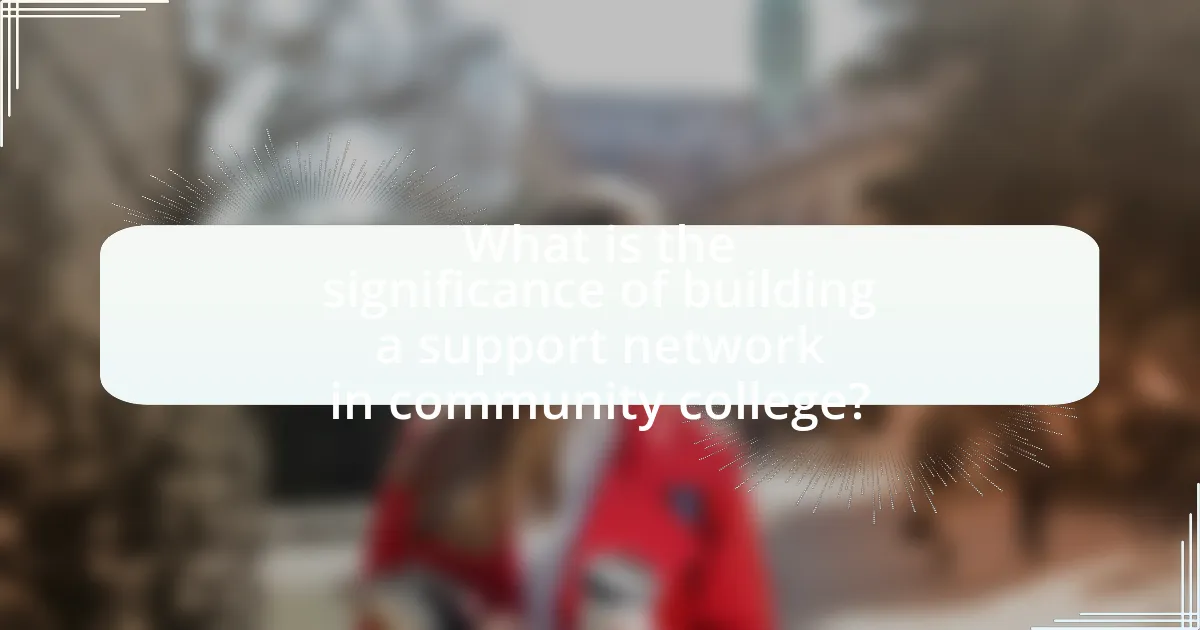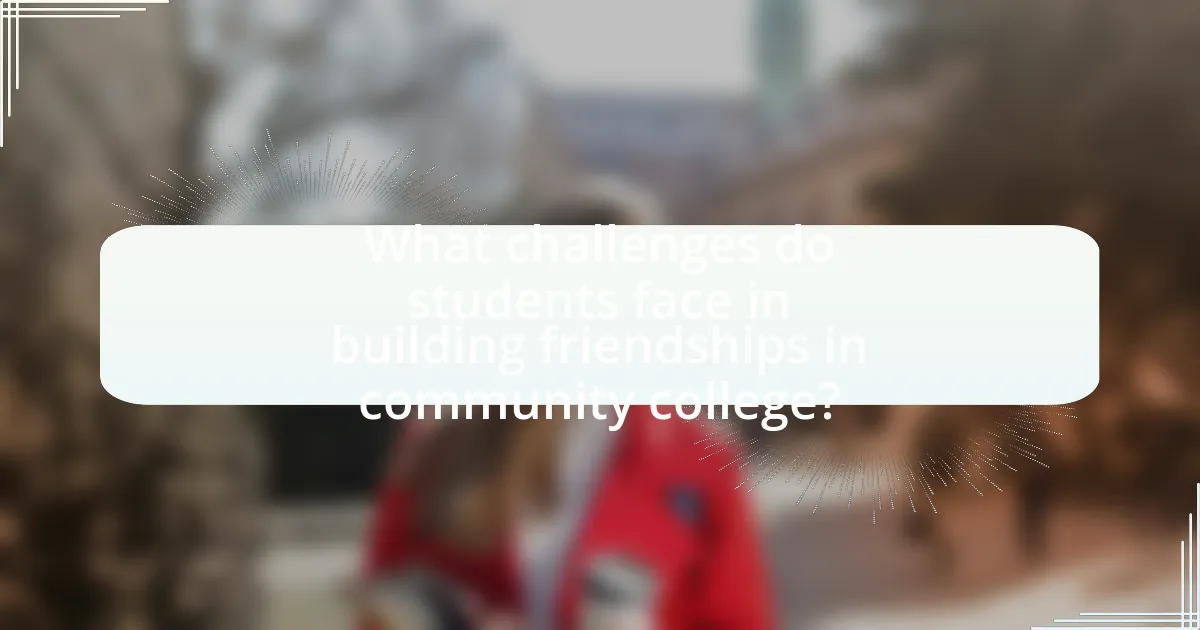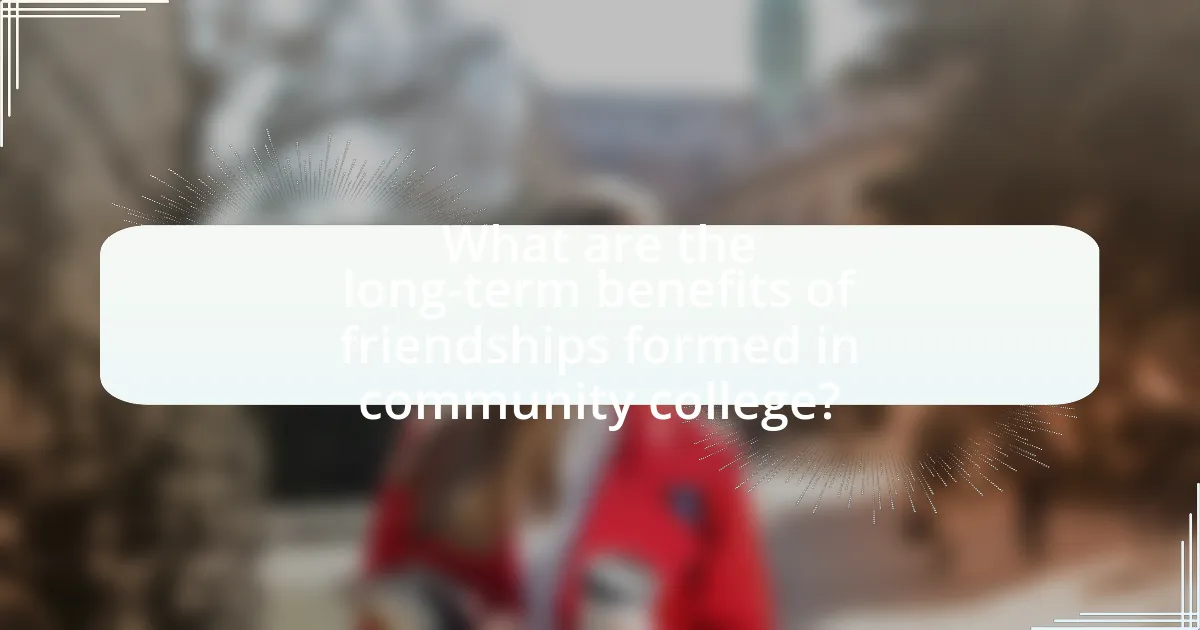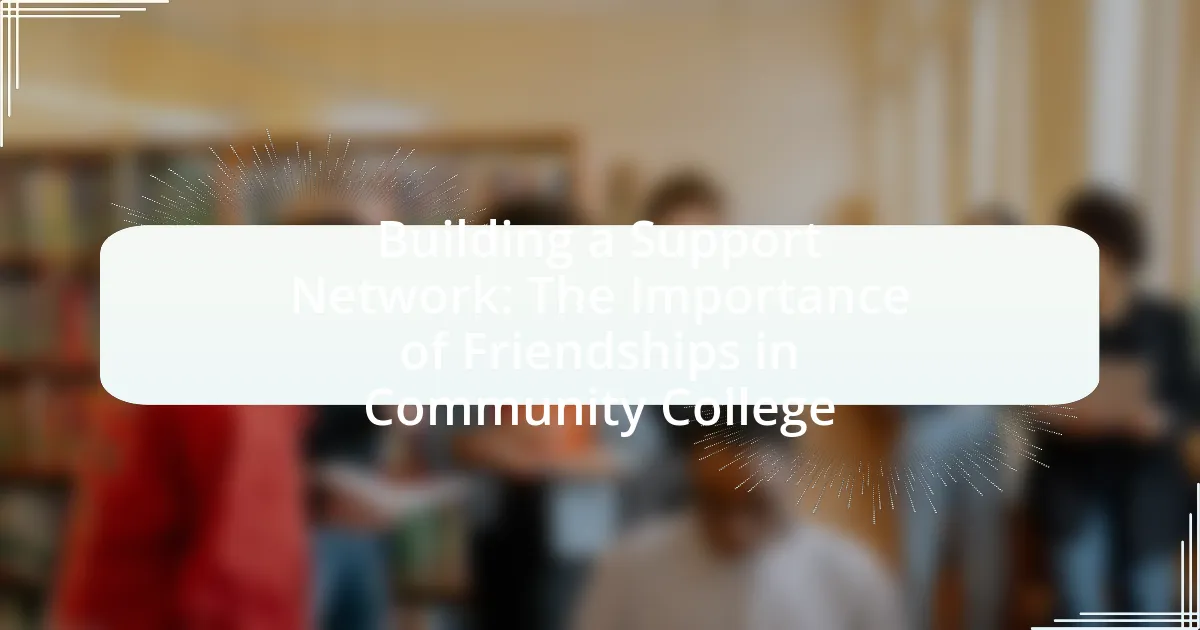Building a support network is crucial for community college students, as it significantly enhances academic success and personal well-being. Strong friendships provide emotional support, reduce stress, and foster a sense of belonging, which are essential for student retention and achievement. The article explores the importance of friendships, the challenges students face in forming these connections, and the various types of support networks available. It also discusses practical strategies for students to build and leverage their networks, highlighting the long-term benefits of these relationships for academic performance and future career opportunities.

What is the significance of building a support network in community college?
Building a support network in community college is significant because it enhances academic success and personal well-being. Research indicates that students with strong social connections are more likely to persist in their studies, achieve higher grades, and experience lower levels of stress. For instance, a study published in the Journal of College Student Development found that students who engaged with peers and faculty reported increased motivation and satisfaction with their college experience. This network provides emotional support, resources for academic challenges, and opportunities for collaboration, all of which contribute to a more enriching educational journey.
Why are friendships important during the community college experience?
Friendships are important during the community college experience because they provide emotional support, enhance academic success, and foster a sense of belonging. Emotional support from friends can alleviate stress and anxiety, which are common among community college students; studies show that social connections significantly improve mental health outcomes. Additionally, friends often collaborate on coursework, share resources, and motivate each other, leading to higher academic performance. A sense of belonging is crucial in community college, as it can reduce feelings of isolation and increase student retention rates; research indicates that students with strong social networks are more likely to persist in their studies and complete their degrees.
How do friendships contribute to academic success in community college?
Friendships significantly contribute to academic success in community college by providing emotional support, motivation, and collaborative learning opportunities. Students with strong friendships often experience reduced stress and increased engagement, which positively impacts their academic performance. Research indicates that social connections can enhance retention rates; for instance, a study published in the Journal of College Student Development found that students who reported having supportive friendships were more likely to persist in their studies and achieve higher grades. This demonstrates that friendships play a crucial role in fostering an environment conducive to academic achievement in community college settings.
What role do friendships play in emotional well-being for community college students?
Friendships significantly enhance the emotional well-being of community college students by providing social support, reducing feelings of isolation, and fostering a sense of belonging. Research indicates that strong social connections can lead to lower levels of stress and anxiety, which are common among students in higher education. A study published in the Journal of College Student Development found that students with close friendships reported higher levels of life satisfaction and emotional stability. These friendships create a supportive environment where students can share experiences, cope with academic pressures, and navigate challenges together, ultimately contributing to their overall mental health and academic success.
How does a support network enhance the community college experience?
A support network enhances the community college experience by providing emotional, academic, and social resources that contribute to student success. Students with strong support networks are more likely to persist in their studies, achieve higher grades, and feel a greater sense of belonging. Research indicates that community college students who engage with peers, faculty, and support services report increased motivation and improved academic outcomes. For instance, a study published in the Journal of College Student Development found that students with supportive relationships experienced lower levels of stress and higher levels of satisfaction with their college experience.
What are the different types of support networks available to community college students?
Community college students have access to various types of support networks, including academic advising, peer mentoring, tutoring services, student organizations, and counseling services. Academic advising provides personalized guidance on course selection and career planning, which is crucial for student success. Peer mentoring connects students with experienced peers who offer advice and support, fostering a sense of community. Tutoring services enhance academic performance by providing additional help in specific subjects. Student organizations, such as clubs and associations, create opportunities for social interaction and networking, while counseling services address mental health and personal challenges, ensuring students have the emotional support they need. These networks collectively contribute to a supportive environment that enhances the overall college experience for community college students.
How can students effectively utilize their support networks?
Students can effectively utilize their support networks by actively engaging with peers, faculty, and community resources to enhance their academic and personal growth. Engaging in study groups allows students to share knowledge and clarify concepts, while seeking mentorship from faculty can provide guidance and encouragement. Additionally, participating in campus organizations fosters connections that can lead to collaborative opportunities and emotional support. Research indicates that students who leverage their support networks are more likely to experience higher retention rates and academic success, as highlighted in a study by Tinto (1993) which emphasizes the role of social integration in student persistence.

What challenges do students face in building friendships in community college?
Students in community college face several challenges in building friendships, primarily due to factors such as diverse schedules, varying age groups, and limited social activities. The diverse schedules of community college students often lead to fewer opportunities for interaction, as many attend classes at different times or are balancing work and family commitments. Additionally, the age range of students can create barriers, as younger and older students may have different interests and social dynamics. Limited social activities, compared to traditional four-year institutions, further restrict opportunities for students to connect and form friendships. These factors collectively hinder the ability of students to establish meaningful relationships in the community college environment.
What factors hinder the formation of friendships among community college students?
Factors that hinder the formation of friendships among community college students include time constraints, diverse backgrounds, and commuter lifestyles. Time constraints arise from students balancing work, family, and academic responsibilities, leaving little opportunity for social interaction. Diverse backgrounds can lead to cultural differences that create barriers to connection, as students may feel hesitant to engage with peers from different ethnic or socioeconomic groups. Additionally, commuter lifestyles limit on-campus engagement, as many students attend classes but do not participate in extracurricular activities or social events, reducing opportunities for forming friendships.
How do time constraints affect social interactions in community college?
Time constraints significantly limit social interactions in community college by reducing the opportunities for students to engage with peers. Many community college students juggle multiple responsibilities, such as work and family, which often leads to a packed schedule that prioritizes academic commitments over socializing. Research indicates that students with limited time for social interactions report feeling isolated and less connected to their peers, which can hinder the development of supportive friendships essential for academic success and personal well-being. A study published in the Journal of College Student Development found that students who actively engage in social activities, even with limited time, report higher levels of satisfaction and academic performance, highlighting the importance of finding balance despite time constraints.
What impact does diversity have on friendship formation in community college?
Diversity positively impacts friendship formation in community colleges by fostering a broader range of perspectives and experiences among students. This variety encourages students to engage with peers from different backgrounds, enhancing social interactions and promoting inclusivity. Research indicates that diverse environments lead to increased collaboration and understanding, as students learn to appreciate differing viewpoints, which can strengthen interpersonal relationships. For instance, a study published in the Journal of Higher Education found that students in diverse settings reported higher levels of social engagement and satisfaction with their college experience, highlighting the role of diversity in creating supportive networks.
How can students overcome barriers to building friendships?
Students can overcome barriers to building friendships by actively engaging in social activities and seeking common interests with peers. Participating in clubs, study groups, or community events fosters connections and provides opportunities for interaction. Research indicates that involvement in extracurricular activities significantly enhances social integration among students, as highlighted in a study by the National Center for Education Statistics, which found that students who participate in such activities report higher levels of friendship formation. Additionally, developing effective communication skills, such as active listening and empathy, can help students navigate social situations more successfully, further reducing barriers to friendship.
What strategies can students employ to initiate friendships in community college?
Students can initiate friendships in community college by actively participating in campus activities and joining clubs or organizations. Engaging in these social settings allows students to meet peers with similar interests, fostering connections. Research indicates that involvement in extracurricular activities significantly enhances social integration and friendship formation among college students. For instance, a study published in the Journal of College Student Development found that students who participated in clubs reported higher levels of social support and friendship satisfaction. Additionally, students can utilize study groups and collaborative projects to build rapport with classmates, further enhancing their social network.
How can involvement in campus activities foster friendships?
Involvement in campus activities fosters friendships by providing opportunities for social interaction and collaboration among students. Engaging in clubs, sports, or events allows individuals to meet peers with similar interests, facilitating connections that can lead to lasting relationships. Research indicates that students who participate in extracurricular activities report higher levels of social integration and satisfaction, which are critical for building a support network in community college settings. For example, a study published in the Journal of College Student Development found that students involved in campus organizations experienced increased feelings of belonging and community, reinforcing the idea that shared experiences in these activities are key to forming friendships.

What are the long-term benefits of friendships formed in community college?
Friendships formed in community college provide long-term benefits such as enhanced social support, improved academic performance, and increased career opportunities. These relationships foster a sense of belonging, which can lead to higher retention rates; studies indicate that students with strong social connections are more likely to complete their degrees. Additionally, friendships often lead to networking opportunities that can facilitate job placements and professional growth, as many community college students collaborate on projects and share resources. Research shows that individuals with robust social networks experience lower stress levels and better mental health, further underscoring the importance of these connections in both personal and professional contexts.
How do friendships in community college influence future career opportunities?
Friendships in community college significantly enhance future career opportunities by providing networking, support, and collaboration. These relationships often lead to job referrals, mentorship, and shared resources, which can be crucial in a competitive job market. Research indicates that 70% of jobs are found through networking, highlighting the importance of connections made during college. Additionally, friendships foster a collaborative learning environment, improving skills and confidence, which are essential for career advancement.
What networking advantages do friendships provide after graduation?
Friendships provide significant networking advantages after graduation by facilitating access to job opportunities, industry insights, and professional connections. Graduates often rely on their friends for referrals and recommendations, which can lead to job placements; studies show that approximately 70% of jobs are found through networking. Additionally, friends can share valuable information about industry trends and events, enhancing professional knowledge and visibility. This collaborative support system fosters a sense of community, which is crucial for career advancement in competitive job markets.
How can friendships formed in community college lead to lifelong connections?
Friendships formed in community college can lead to lifelong connections due to shared experiences and mutual support during a critical transitional period in life. These friendships often develop through collaborative learning, group projects, and social activities, fostering a sense of belonging and trust. Research indicates that individuals who form strong social ties during educational experiences are more likely to maintain those relationships over time, as evidenced by a study published in the Journal of Educational Psychology, which found that 70% of students reported staying in touch with friends made during college years. This ongoing connection is reinforced by shared memories, similar life paths, and the emotional support that these friendships provide, making them resilient and enduring.
What practical steps can students take to build a strong support network?
Students can build a strong support network by actively participating in campus activities and organizations. Engaging in clubs, study groups, and social events fosters connections with peers who share similar interests, enhancing the likelihood of forming meaningful relationships. Research indicates that students involved in extracurricular activities report higher levels of satisfaction and support, as these environments encourage collaboration and friendship development. Additionally, students should seek mentorship from faculty and staff, as these relationships can provide guidance and resources, further strengthening their network.
How can students identify and connect with potential friends in community college?
Students can identify and connect with potential friends in community college by participating in campus activities and joining clubs or organizations that align with their interests. Engaging in these social settings allows students to meet peers with similar hobbies or academic goals, fostering natural connections. Research indicates that involvement in extracurricular activities significantly enhances social integration and friendship formation among college students, as highlighted in a study published in the Journal of College Student Development, which found that students who participate in campus organizations report higher levels of social satisfaction and support.
What role do mentorship and peer support play in building a support network?
Mentorship and peer support are crucial in building a support network as they provide guidance, encouragement, and shared experiences that foster personal and academic growth. Mentorship offers individuals access to experienced advisors who can share valuable insights, helping mentees navigate challenges and make informed decisions. Peer support creates a sense of belonging and community, allowing individuals to connect with others facing similar experiences, which enhances emotional resilience. Research indicates that students with strong mentorship and peer support systems are more likely to persist in their studies and achieve academic success, as evidenced by a study published in the Journal of College Student Development, which found that peer relationships significantly impact student retention rates.

Leave a Reply